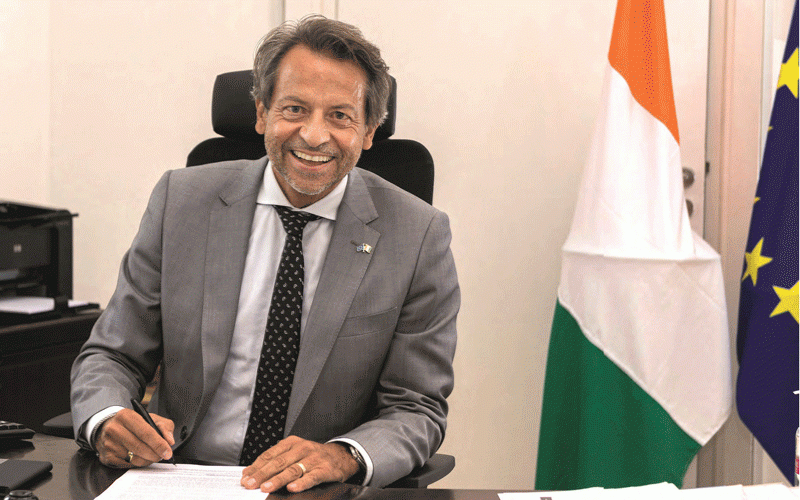

SPECIAL REPORT BY BLESSED MHLANGA
According to Banda, the crater opened in his garden just less than three metres from his doorstep while he was watering his vegetables. “I was watering my garden when all of a sudden the ground opened and swallowed my fruit tree, vegetables and hedge.
“I was struck with fear and am still afraid because I am not sure if my house is safe,” he said at that time.
The incident ignited talk that the City of Kwekwe, which seats on top of a network of gold mining tunnels, could be in danger of collapsing and residents have called on an immediate plan of action to move the city off the tunnels.
Residents’ fears are not without basis considering that the mining town has been blighted with serious illegal mining activities spearheaded by panners who have no regard for safety, human life or infrastructure.
In one of their activities, illegal panners dug and emerged from under a classroom at Globe and Phoenix Primary School in the dead of the night.
- Chamisa under fire over US$120K donation
- Mavhunga puts DeMbare into Chibuku quarterfinals
- Pension funds bet on Cabora Bassa oilfields
- Councils defy govt fire tender directive
Keep Reading
The block has since been sealed off while there are continued fears that the school might be unstable and unsafe for continued use.
Kwekwe sits on top of oldest mines
Kwekwe sits on top of one of the oldest known gold mines, what was originally known as King Solomon’s Mine and later Globe and Phoniex Mine (G&P) in the 1960s which is now owned by Kwekwe Consolidated Gold Mines (KCGM).
KCGM general manager Emanuel Toga Nhamo has dismissed concerns that one day the nation could wake up to find parts of the city or even the enterity of it swallowed by the mining tunnels.
“It is not like the mine came to the town, mining activities started way before the town was built, which means that when the town was being built, all due care was taken to ensure the buildings would be safe,” Nhamo said.
He said previously the mine has had a specialist representative who sat on the council board to ensure that all activities of the local authority were co-ordinated with those of the mine.
“The mine would present blueprints of its mining activities, tunnels and other exploration work to council so that the sinking of boreholes and tall buildings would be done outside the mine works and on safe areas,” he says.
The structured mining which took place under KCGM was, however, overtaken in 2005 when illegal gold panning became the unofficial campaign tool for some political party.
‘Panners belong to political party’
These panners campaigned for the political party by day and worked underground by night worked without regard to safety, panning through underground pillars which supported the weight of the ground above.
‘Swallowed’ garden not an isolated case
The garden which was swallowed is no isolated incident because in February a few kilometres away from the compound, a miner on his way to work was swallowed when the ground gave in under him.
Unfortunately, the miner died.
In Shurugwi, an entire two-roomed house disappeared into the ground after a mine tunnel collapsed, calling into question the indiscrimante mining activities taking place in the country.
Mine draftsman and surveyor Lewis Makiyi says in digging the mining tunnels, pillars were left on strategic areas to ensure that the ground did not collapse.
“These pillars are in what we call the ore zone and, therefore, some of the pillars will naturally contain gold ore which has now become the target of illegal gold miners,” he said.
He was, however, quick to say that the tunnels that ran beneath the city were very deep and did not pose any danger to the buildings sitting on top.
“The longest tunnel is 43km long and is 873m deep running through the heart of the coty and these depths are below sea level which is about level 26 and 27. But these tunnels are very narrow and do not cause any significant threat to the buildings,” he says.
Former curator toyed with tourism spot idea
Former curator of mines with the National Mining Museum Wonai Mafuma told NewsDay he had once toyed with the idea of turning some of the mining tunnels at G&P mine into tourism spots, but abandoned the idea because of the unsafe nature of the tunnels.
“We met with mine representatives and told them of our plans of having some tunnels converted into tourism spots, but because of the illegal underground mining activities, the project was abandoned because it would have been unsafe,” he says.
Officials on fact-finding mission
Recently, provincial mining engineer Peter Paswavaiviri toured the city with KCGM mine officials and mine syndicates on a fact-finding mission on the safety of the town.
Paswavaiviri refused to divulge more information on the findings following the assessment of the situation, saying a detailed report would be forwarded to the Chief Mining Commissioner.
Kwekwe mayor Matenda Madzoke says his management has been in touch with the Mines ministry which has assured him that the city is safe and there are no reasons to panic.
“Kwekwe is not in any danger according to the information I have from the Ministry of Mines. We have inquired with them following the tour and they have assured us that all is safe,” he said.
Makiyi says the mine engineers are always involved when major building projects are taking place in the city especially when the five-storey TelOne Pension Fund Building was constructed in Kwekwe.
“We were working together with the pension fund owners helping them with the correct elevation and the weight which could be carried without disturbing the tunnels underneath,” he says.
Sentences imposed for those in breach of mines act
It remains a crime in Zimbabwe to prospect for gold without a licence, with those caught in breach of the Gold Trade Act facing a mandatory sentence of two years in prison for prospecting, while those caught in illegal possession of gold face a mandatory five years in prison.
Nhamo gave assurance that Kwekwe would remain safe as long as the mining activities were controlled and done by people who were qualified to do the work.
“What is needed is controlled mining carried out by qualified personnel, but currently because of the mine ownership wrangle, we do not have full control of the activities which are going on,” he said.
KCGM is embroiled in a now two-year-long mine ownership wrangle with Midkwe Minerals which forcibly took over Chaka Gold Plant and Mine.
Gaika Gold Fields, which also lie in the suburbs of Fitchlea, have their own mine tunnels which run beneath the city although not much attention has been given to them.
Despite these dangers which have left the entire city exposed, gold panning and dealing has changed the lives of many people in the city.
Some have bought houses, posh cars and live on the high side of life despite the fact that they are uneducated and would not normally have decent jobs and income.
However, others have remained very poor due to ill spending once they get hold of a few dollars.
Adapt or move the city — panners
Illegal panners who spoke off the record for fear of “victimisation” by the police are indifferent to the situation and have said if their works are disturbing the city, then it is Kwekwe which should move and not their works to be stopped.
“Companies are closing down and we have no other way of feeding our families apart from panning for gold. Some of my friends have died while underground searching for gold, but the next morning we go back because we have no choice,” a panner said.
Another panner who has escaped numerous running battles with the police said nothing would stop him from getting the precious metal.
“I will not be stopped by anything, not the least of buildings or roads. If there is money (gold), we will get it, even from under the police station. So it’s either you move your Kwekwe or learn to live with us,” he said.
The panners are known to have rooted out sewer and water supply lines in activities which have cost the local authority thousands of dollars to repair.
Former mayor Shadreck Tobaiwa once said: “Gold panners are causing havoc in the city. They are deliberately blocking sewer systems and breaking our water pipes to access water for their panning activities.
The situation has now gone out of hand and we are appealing to the government and the police to intervene. It is unfortunate that the Environmental Management Agency only focuses mainly on organisations and companies, paying little regard to illegal gold panners and individuals who cause land degradation.”
MP blasts fellow Zanu PF officials
Kwekwe Central Member of Parliament Masango Matambanadzo, who has extensive experience in small-scale mining, accused top Zanu PF members of being at the centre of illegal and dangerous gold panning activities.
Matambanadzo said they used their political muscle to evade the Ministry of Mines regulations and police while in the process endangering the lives of panners who benefit little or nothing from their toils.
“General mining in Kwekwe is safe, but there are pockets of areas which are indeed dangerous and over the past two months, I have been called to assist four panners trapped while working underground in those areas controlled by top political guns in our party.
“They carry out these mining activities without any exploration certificates or regard to the safety of the panners who I have had to save and fund for their medical bills,” Matambanadzo said.
He, however, dismissed any fears that the city was under threat of illegal gold mining activities, saying none of the panners had the capacity to reach the tunnels under the city.
“Panning activity is only taking place at level one of the mining tunnels because other levels from 3 to 46 are filled with water and cannot be accessed, so nobody is going there,” he said.











